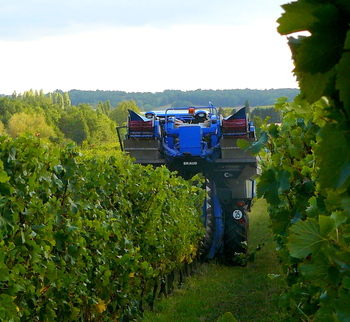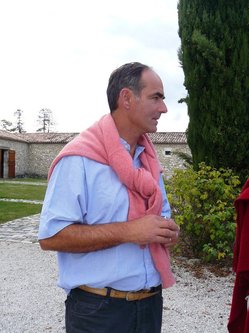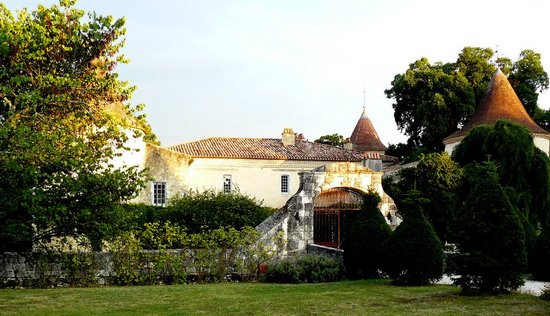 You're looking at the future of viticulture, at least for the vast majority of vineyards in France: a giant machine that straddles the vines, picks the ripe berries without hurting the leaves or branches, and throws out all the MOG (material other than grapes). We're in the heart of the vast region known world-over as "Bordeaux," a term that carries the glamor (and astronomic cost) of the well-known First Growths, but that also covers another 10,000 or so winemaking estates that produce, all told, as much wine as all of California.
You're looking at the future of viticulture, at least for the vast majority of vineyards in France: a giant machine that straddles the vines, picks the ripe berries without hurting the leaves or branches, and throws out all the MOG (material other than grapes). We're in the heart of the vast region known world-over as "Bordeaux," a term that carries the glamor (and astronomic cost) of the well-known First Growths, but that also covers another 10,000 or so winemaking estates that produce, all told, as much wine as all of California.
And the machine in the photos is lumbering through one of the properties, Château Couronneau, owned by an upbeat, energetic former wine merchant named Christian Piat, and his conundrum is this: having invested a fortune in replanting his 100-acre vineyard (a densely planted, organically managed merlot grapes), and having built a modern winery essentially from scratch, the marketplace values his best wine for less thn $10 on the local market, even after winning the top prize at the annual wine competition judged by professional enologists. No matter how good his wine, he's located in an obscure geographic zone called Ste. Foy, so he opts to use instead the term Bordeaux Supérieur, which at least carries some regional prestige.
 If he brought in a team of local workers (or one of the itinerant Spanish families that show up at harvest time), he'd have to pay them the current minimum wage, about 9 euros ($12 or so) with overhead, call it 100 euroes per picker. The rule of thumb is that a crew of ten people can harvest one hectare a day. Christian owns 40 hectares, you'll recall, so figure almost 40,000 euros just to harvest the grapes.
If he brought in a team of local workers (or one of the itinerant Spanish families that show up at harvest time), he'd have to pay them the current minimum wage, about 9 euros ($12 or so) with overhead, call it 100 euroes per picker. The rule of thumb is that a crew of ten people can harvest one hectare a day. Christian owns 40 hectares, you'll recall, so figure almost 40,000 euros just to harvest the grapes.
The machine, which is owned by a friend, chugs through the vines at a steady 3 miles an hour, paddling and shaking the vines at the rate of about one hectare (2.5 acres) every two hours. And it's "cleaner" than hand picking (no rotten or underripe berries, for example; they don't fall off when the machine shakes and paddles the vine), and newer models like this one have a built in destemmer besides. When the trailer pulls into the crush pad on the other side of the hill, the grapes are ready to be conveyed into the fermenting tanks.
The payoff is partly financial: Christian rents the machine, driver included, for 250 euros an hour; total 20,000 euros. That's a savings of 20,000 euros in labor, which isn't a huge amount when spread over the 150-to-200 thousand bottles produced on the property every year, but at least it's a start. Even 10 cents less per bottle in production costs is significant when your costs hover around $3 per bottle. The most important thing: you don't have to feed and house the machine; it runs for more than eight hours a day; and you can pick each plot exactly when it's ready, an essential part of this carefully managed estate.
By the way, Château Couronneau is where jazz musicial Kyle Eastwood (son of Clint) recently recorded his latest album, taking over one whole wing for the band. Kyle, who recently played a live gig on KPLU in Settle, is quite a Francophile, it seems. His current release, Metropolitain, is an homage to Paris. The next one, title yet unknown, will be an homage to the peaceful countryside of southwestern France.

Leave a comment